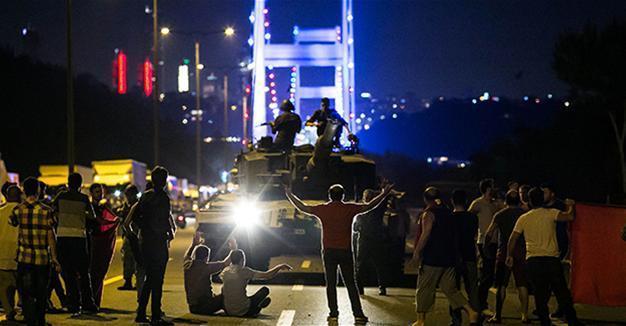Panel report blames Gülen for July 2016 coup, cites intel agency negligence
ANKARA

AFP photo
A report penned by a parliamentary panel tasked with probing the July 2016 coup attempt has determined that the Fethullahist Terror Organization (FETÖ) was absolutely behind the putsch while also noting that there was a general intelligence failure in preventing the deadly attempt.
“In light of all the evidence and documents, it’s been assessed that the July 15 coup attempt was planned and executed by FETÖ under the leadership of Fethullah Gülen who was raised, protected and supported inside and outside the country by some foreign groups,” Reşat Petek, the head of the parliamentary panel, told reporters at a press conference on May 26.
Petek disclosed the 639-page report and its documents provided by the National Intelligence Organization (MİT) but did criticize the intelligence organization’s negligence in preventing the deadly incident. Some 249 people were killed and around 2,000 were injured during the country’s bloodiest coup attempt.
“There is no doubt that not being able to have intelligence before the coup attempt constitutes an intelligence deficiency,” Petek said.
Petek said MİT’s actions right after an informant provided information about the putsch’s preparations on the afternoon of July 15 caused the coup plotters to bring forward the timing of the coup from 3 a.m. on July 16 to 8:30 p.m. on July 15.
“This was determined to be one of the most important factors in preventing the success of the coup,” Petek said.
Petek also suggested a new structure for MİT by separating foreign and domestic operations in a bid to increase the efficiency of the intelligence organization.
No findings on political leg
Touching on a heated argument about the missing political leg of the ongoing FETÖ operations, Petek said the Gülen movement did not limit its cooperation to a single political party but had infiltrated all parties who have been in power or a part of a coalition government over the years in order to enter state bodies, including the judiciary, military and police department.
Citing 2010 constitutional amendments that paved the way for FETÖ members to acquire full control of the Turkish judicial system, Petek said the group was in cooperation with the Justice and Development Party (AKP) at that time.
Asked about the connections of prominent politicians to FETÖ, Petek said the report did not make any assessment on the political leg of the organization.
“We have been subjected to some criticisms from time to time. But it’s a fact that we have not found out any connection with a certain political party,” he said.
Turkey’s opposition parties have criticized the AKP for allegedly protecting FETÖ members within the party.
FETÖ could turn into marginal terror group
Although FETÖ has lost its ability to stage another coup in Turkey, it could turn into a marginal armed terror organization given the fact that there could still be unidentified FETÖ members within police departments, Petek said.
It also urged the government to undergo systemic and organizational changes at security and intelligence institutions and to create a coordination mechanism that functions better between different state entities.
The report also called on the government to take all necessary measures at all educational institutions so as to prevent similar groups from brainwashing the youth in the same way FETÖ has done over the decades.
Top soldier did not speak to panel
Petek said Chief of General Staff Gen. Hulusi Akar did not reply to the panel’s written questions even though they were sent months ago, while stressing that Gülenists began infiltrating the army in the 1980s, meaning that all senior on-duty and former military officials and government members bore some responsibility for the state of affairs.
The report studied the growth of FETÖ since the mid-1960s and detailed its national and international structure under Gülen’s leadership. The study alleged that Gülen was linked to foreign secret services without elaborating, although it did note that former CIA personnel supported Gülen in acquiring a U.S. green card.
